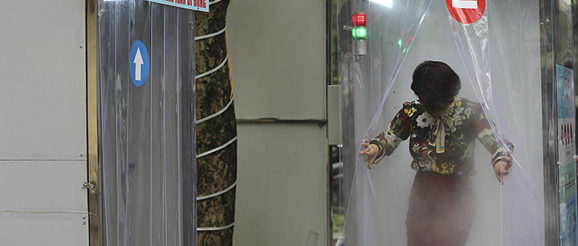Covid-19 innovation: Vietnam’s mobile chambers allow disinfection in one go – VnExpress International

Covid-19 innovation: Vietnam’s mobile chambers allow disinfection in one go
Vietnamese experts have created a set of mobile chambers to sanitize the whole body of those working in coronavirus infected areas.
The National Institute of Occupational and Environmental Health and the Hanoi University of Science and Technology have fabricated them for disinfecting people who directly treat or work with Covid-19 patients.
The system consists of two chambers. One sprays electrolyzed water in the form of droplets and the other directs heat and ozone onto the body of the person. Produced by electrolyzing ordinary tap water containing dissolved sodium chloride, it can even clean the respiratory system.
Doan Hong Hai, head of the institute, said the institute decided to make it since people who directly work in areas where infections are detected or treated do not have any means to disinfect themselves fully.
The system, according to Hai and the research team, can get rid of 99.99 percent of the new coronavirus, which is 1/900th the size of a human hair and clings to the surfaces of clothes, shoes bags and others.
The main component of the wet chamber is a 360-degree fog mist sprayer and an infrared sensor that automatically activates the spraying when a person steps in.
The dry chamber uses heat and ozone at permitted level to ensure safety for the disinfected person. It takes one 30 seconds to complete a round of disinfection in each chamber, which measures one meter wide and two meters tall and is movable.
The entire system is designed and manufactured locally. The institute and the university have yet to come up with a cost for commercial production. It is estimated that the system can disinfect up to 1,000 people per day.
Vietnam has recorded 57 Covid-19 cases so far, and 16 of them had been discharged weeks ago. The Covid-19 outbreak has thus far spread to 157 countries and territories, with the death toll climbing to over 6,500.
